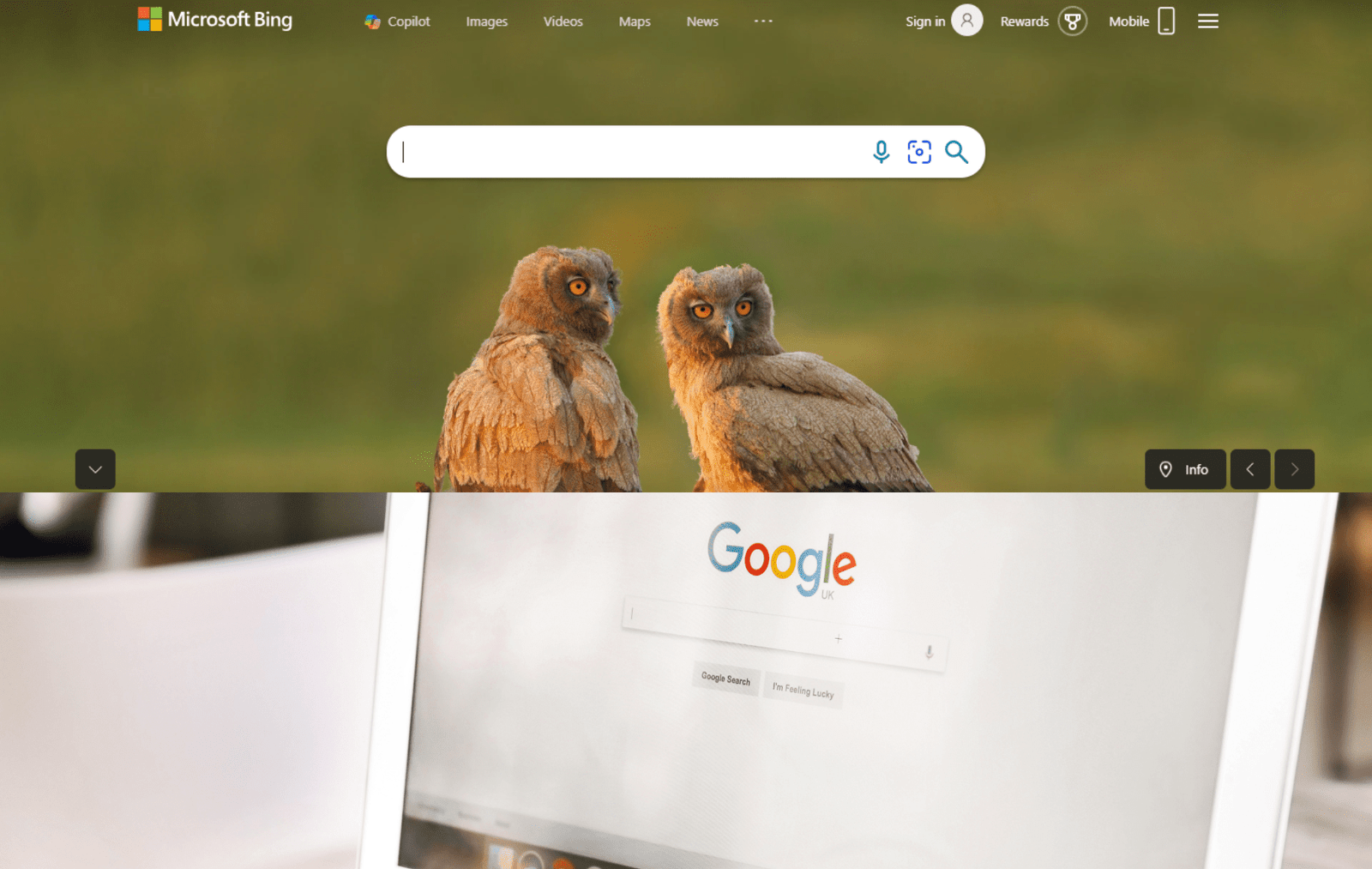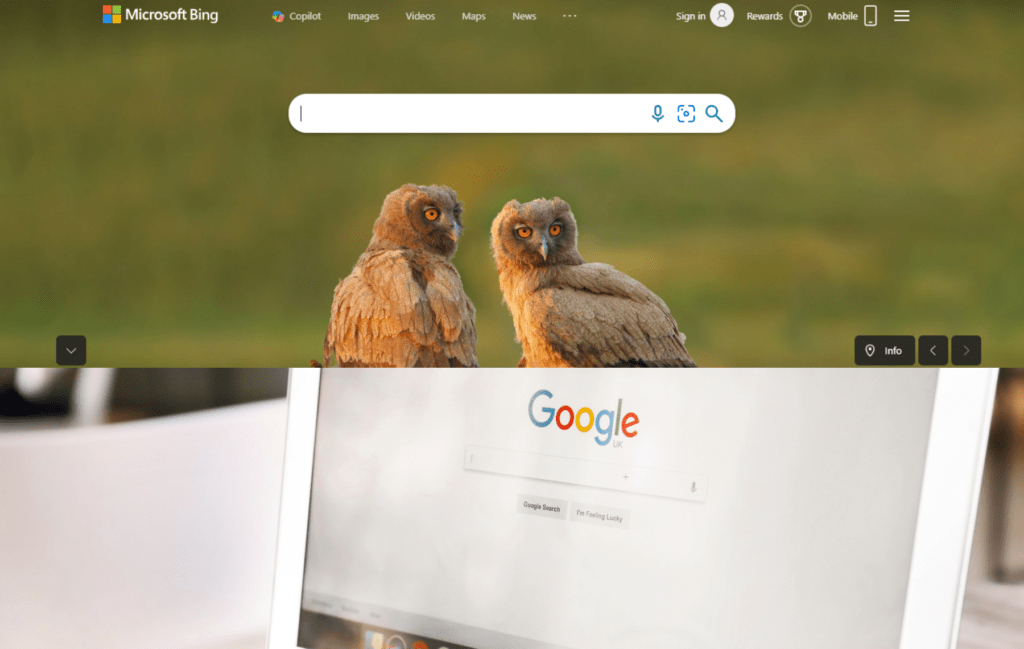Bing Search vs Google: 7 Key Differences in SEO and Search Engine Performanc

Bing search vs Google: which is better for your needs? The competition between these two search engines isn’t just about who provides the most results; it’s about how those results meet your requirements. Bing offers unique features and doesn’t always follow the same rules as Google, making it beneficial for certain users and businesses.
When comparing Bing SEO vs Google SEO, you’ll find notable differences in how each platform ranks content. Google uses complex algorithms, focusing on backlinks and user engagement, while Bing places more emphasis on page structure and social signals. Understanding these distinctions can help you optimise your content effectively for both search engines.
Exploring the difference between Google and Bing search engines reveals insights that can enhance your online presence. For instance, Bing tends to cater better to older demographics, while Google is widely popular among younger users. By recognising these differences, you can tailor your marketing strategies and make informed decisions to maximise your online visibility.
Table of Contents
Comparing User Experience and Performance

User experience and performance are key factors when choosing between Bing and Google. Each search engine has distinct features that affect how you find information and interact with results.
Differences in Search Algorithms
Bing and Google use different algorithms to deliver results. Google focuses on relevance and user intent, often returning very quick, precise answers. This can make it easier for you to find what you need.
Bing, on the other hand, also considers social signals, often showcasing content popular on platforms like Facebook. This can make your search results feel more social and current. The differences in these algorithms can lead to varied results for the same query.
Analysis of SERPs
Search Engine Results Pages (SERPs) also differ between Bing and Google. Google’s SERPs often display rich snippets, images, and answer boxes at the top. These features help you get information faster without clicking through.
Bing’s SERPs can be more visually appealing, offering a unique layout with image-heavy previews. Additionally, Bing often highlights ads more prominently than Google. This can change how you perceive search results and decide which links to click.
Privacy Considerations in User Experience
Privacy is an important concern when using any search engine. Google collects a lot of data about you to personalise your experience. This can enhance your results but may feel intrusive.
In contrast, Bing collects less personal data. Microsoft emphasises privacy controls, allowing you to manage your information better. This aspect can create a different user experience, letting you choose how much information you share.
SEO Strategies for Bing and Google
Optimising for search engines like Bing and Google requires understanding their unique features. You need tailored strategies for each platform to improve your visibility and drive organic traffic.
Optimising for Bing SEO
To get your site noticed on Bing, start by focusing on a few key elements. Bing favours websites with a strong presence on social media. Share content consistently across platforms to boost your site’s authority.
Next, on-page optimisation is crucial. Ensure your website’s titles, headings, and meta descriptions contain relevant keywords. Use clear and descriptive URLs as Bing appreciates sites that are user-friendly.
Bing also emphasises using multimedia. Incorporate images and videos, but remember to include alt text. This enhances accessibility and aids in rankings. Lastly, leveraging Bing Webmaster Tools can provide valuable insights on your site’s performance. Monitor your site’s analytics regularly.
Mastering Google SEO
For Google, the focus remains on quality content. Create informative, valuable articles that answer user queries while integrating targeted keywords naturally. Use header tags to structure your content, making it easier for both users and search engines to read.
Mobile-friendliness matters a great deal. Ensure your site is responsive, as Google prioritises mobile users. Page speed is another critical factor. Use tools like Google PageSpeed Insights to evaluate and enhance your website’s loading time.
Link building is an essential aspect of Google SEO. Aim for quality backlinks from authoritative sites to boost credibility. Regularly updating your content and maintaining an active blog can also keep your audience engaged and improve rankings.
Google vs Bing comparison

When comparing Google and Bing, two of the most prominent search engines, several factors come into play, including user experience, features, and performance. Here’s a detailed comparison to help you understand the strengths and weaknesses of each:
1. Search Algorithm
Google: Google’s search algorithm is known for its complexity and frequent updates. It prioritizes relevance and quality of content, often delivering highly tailored results based on user intent and behavior.
Bing: Bing’s algorithm also focuses on relevance but tends to emphasize different factors, such as social signals and multimedia content. It may provide different results for the same query, often highlighting images and videos more prominently.
2. User Interface
Google: Google features a clean and minimalist interface that prioritizes simplicity. The search results page is straightforward, with a focus on text-based results, ads, and snippets.
Bing: Bing has a more visually engaging interface, often showcasing beautiful background images and a more colorful layout. It also integrates additional features like a sidebar for related searches and news.
3. Search Features
Google: Google offers a range of advanced search features, including Knowledge Graph, featured snippets, and voice search. It excels in providing quick answers and rich results.
Bing: Bing also has unique features, such as visual search and integration with Microsoft products. Its image search is particularly strong, often providing better filtering options and layout than Google.
4. Local Search
Google: Google is widely recognized for its robust local search capabilities, thanks to Google My Business. It provides detailed local listings, reviews, and maps, making it easy for users to find nearby services.
Bing: Bing has local search features as well, but they are not as comprehensive as Google’s. While it offers maps and business listings, the depth of information and integration with local businesses may vary.
5. Market Share
Google: Google dominates the search engine market with a market share of over 90%. Its widespread usage means that most SEO strategies are primarily focused on Google.
Bing: Bing holds a smaller market share, around 6-8%, but it is the default search engine for Microsoft products and has a loyal user base. It’s particularly popular among users of Windows devices.
6. Advertising
Google: Google Ads is a powerful advertising platform that allows businesses to reach a vast audience through targeted ads. Its extensive analytics tools help advertisers optimize their campaigns effectively.
Bing: Bing Ads (now called Microsoft Advertising) is less competitive than Google Ads, often resulting in lower costs per click. While it may have a smaller audience, it can be a cost-effective option for advertisers looking to reach specific demographics.
7. Privacy
Google: Google has faced scrutiny over privacy concerns, particularly regarding data collection and user tracking. While it offers privacy settings, users must actively manage them.
Bing: Bing, backed by Microsoft, emphasizes user privacy and offers features like “InPrivate” browsing. Microsoft has made strides in providing users with more control over their data.
Both Google and Bing have their unique strengths and weaknesses. Google excels in search accuracy, local results, and a wide range of features, while Bing offers a visually appealing interface and strong image search capabilities. Depending on your needs, preferences, and the audience you’re targeting, either search engine can be beneficial in different contexts.
Market Insights and Trends
When looking at Bing search vs Google, trends reveal interesting differences. Google remains the dominant player, holding around 90% of the market share. In contrast, Bing has about 6%. While Google leads, Bing offers unique features that appeal to specific users.
Mobile Search continues to grow. More people use their phones to search on the go. Google is optimised for mobile, and it’s essential to ensure your site works smoothly on devices. Bing, recognising this trend, has also improved its mobile experience but still trails behind.
Voice search is another game-changer. People prefer asking questions rather than typing. Google’s Assistant and Apple’s Siri are widely used. Bing powers Microsoft’s Cortana, which appeals to Windows users. This shift towards voice search is reshaping how users interact with both search engines.
Device integration is crucial in 2024. Google provides seamless integration across multiple devices. From smartphones to smart home devices, everything syncs perfectly. Bing is working on improving this aspect as well, but Google has a head start.
Market trends suggest that user preference is evolving. As technology advances, the way you optimise for search engines like Google and Bing needs to adapt. Keeping an eye on these insights will help you stay ahead in the digital landscape.
7 Key Differences in SEO and Search Engine Performance
Understanding the nuances between SEO (Search Engine Optimization) and search engine performance is crucial for anyone looking to enhance their online presence. Here are seven key differences that highlight how these concepts interact and differ:
1. Definition
SEO: Refers to the practice of optimizing a website to improve its visibility in search engine results pages (SERPs). This involves various strategies, including keyword research, content creation, and link building.
Search Engine Performance: Refers to how well a search engine functions in delivering relevant results to users. This includes factors like speed, accuracy, and the effectiveness of algorithms.
2. Focus
SEO: Focuses on improving a website’s rankings and visibility through on-page and off-page techniques. The goal is to attract more organic traffic.
Search Engine Performance: Concentrates on the overall efficiency and effectiveness of the search engine itself. This includes how quickly it can index pages and return relevant results to users.
3. Techniques
SEO: Involves specific techniques such as optimizing meta tags, improving site structure, and creating quality backlinks. These techniques are aimed at making a website more appealing to search engines.
Search Engine Performance: Involves technical aspects like algorithm updates, server response times, and data processing capabilities. These factors determine how well a search engine can operate.
4. Measurement
SEO: Success is measured through metrics such as organic traffic, keyword rankings, and conversion rates. These indicators reflect how well a website is performing in search results.
Search Engine Performance: Measured through metrics like search speed, accuracy of results, and user satisfaction. These indicators help evaluate the effectiveness of the search engine itself.
5. Timeframe
SEO: Results from SEO efforts can take time to manifest, often requiring weeks or months to see significant changes in rankings and traffic.
Search Engine Performance: Performance improvements can often be implemented and measured more quickly, especially with algorithm updates or technical enhancements.
6. User Interaction
SEO: Directly impacts how users interact with a website, influencing their experience based on content quality and site usability.
Search Engine Performance: Affects how users interact with the search engine itself, shaping their experience based on the relevance and speed of search results.
7. Goals
SEO: The primary goal is to increase a website’s visibility and attract more visitors, ultimately leading to higher conversions and sales.
Search Engine Performance: The goal is to provide the best possible search experience for users, ensuring they find the information they need quickly and accurately.
In summary, while SEO and search engine performance are interconnected, they serve different purposes and involve distinct strategies and metrics. Understanding these differences can help you better navigate the digital landscape and optimize your online presence effectively.
Frequently Asked Questions
Which search engine has the larger market share in 2024, Google or Bing?
As of 2024, Google continues to dominate the search engine market with a share of over 90%. Bing holds a significantly smaller percentage, often cited around 6-7%. This difference highlights Google’s widespread usage and influence in search practices.
How do user demographics differ between Bing and Google?
User demographics reveal interesting patterns. Google attracts a diverse user base, often including younger individuals looking for trends and information. Bing tends to attract older users, particularly in professional settings, where it is integrated with Microsoft products.
What are the primary distinctions in SEO strategies for Bing and Google?
When it comes to SEO, Google prioritises high-quality backlinks and content relevance. Bing, on the other hand, places more weight on page authority and social signals. Marketers should tailor their strategies accordingly to achieve better rankings on each platform.
In terms of search accuracy and relevance, how do Bing and Google compare as of 2024?
Google is generally regarded as more accurate in delivering relevant results. Its algorithms are continuously updated to improve user experience. Bing has made strides in this area but often trails behind Google in precision and user satisfaction.
What impact has ChatGPT had on the usage and functionalities of Bing and Google?
ChatGPT has influenced how users interact with both Bing and Google. Both search engines are integrating AI features to enhance search results. This development aims to provide more personalised and conversational responses, improving user engagement.
Can you enumerate the essential differences between the various search engines available today?
Each search engine has its unique features. Google excels in algorithm complexity and speed, while Bing focuses on image search and integration with Microsoft services. Other engines like Yahoo and DuckDuckGo cater to niche needs, such as privacy and customisation.
